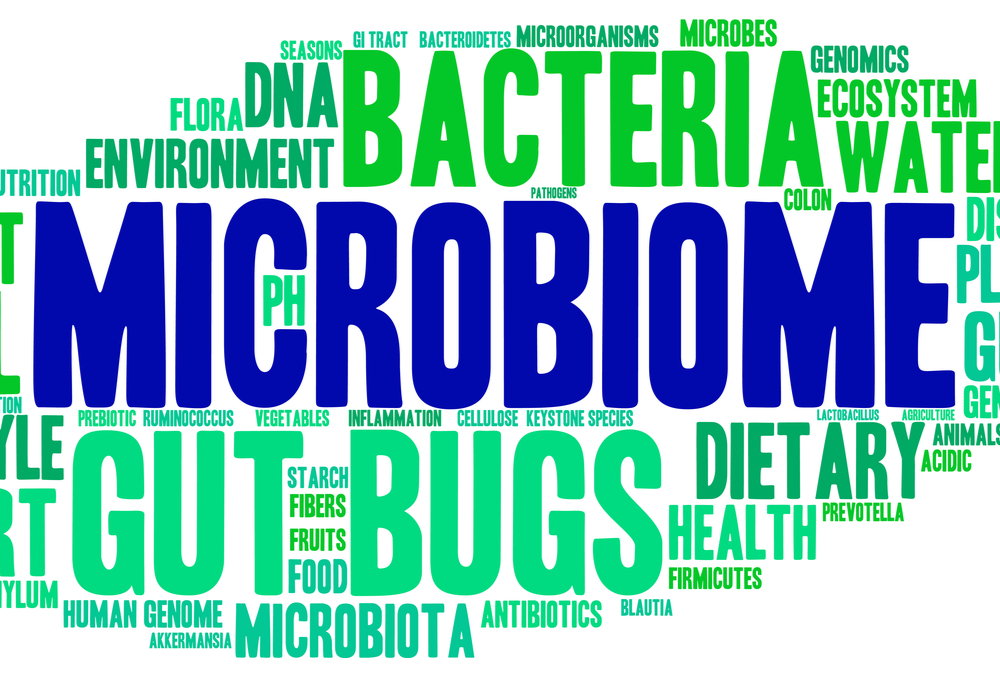By: Duke Health & Well-Being Nutrition Team
We have all heard the cliché that “you are what you eat.” But what if it’s not that simple? Perhaps instead we should say that “you are what your gut bacteria eat.”
Each of us is home to trillions of bacteria, fungi, and viruses that peacefully coexist in and on our bodies. These microbes make up microbiomes, with the gut microbiome being the largest and most diverse. Over the last decade, we have come to recognize how important the gut microbiome is to both our physical and psychological wellbeing. Below we answer common questions about the gut microbiome and explore what we can do to support a healthy gut.

Of the 100 trillion microbes that exist in our bodies, about 80% live in the gut (Wang, 2016). This includes more than 5000 microbial strains that are dominated by bacterial Bacteroidetes and Firmicutes (Wang, 2016; Grenham et al., 2011). When it comes to the microbiome and overall health, researchers have found that, surprisingly, “even healthy individuals differ remarkably in the microbes that occupy habitats such as the gut” (Human Microbiome Project Consortium, 2012).
While the microbiome is usually stable over time, things like stress, diet, environmental exposures, and antibiotics can lead to both short- and long-term disruptions. For instance, while antibiotics are an important tool for fighting infection, they can wreak havoc on our gut by killing off beneficial bacteria (Langdon et al., 2016). It can take up to three years for the gut to recover from a single round of antibiotics (Jernberg et al., 2007; O’Mahony et al., 2015). Diet also plays a huge role in the composition of the gut. The Standard American Diet, low in plant-based fiber but high in sugar and processed food, increases inflammation which can set the stage for chronic disease (Grenham et al., 2011; Hills et al., 2019). On the other hand, an eating pattern high in plant foods with regular intake of fermented and cultured foods promotes a balanced and healthy gut ecosystem.
Babies are born with a sterile gut, but this quickly changes after birth. The mode of delivery (C-section or vaginal) plays a big role in the initial microbiome, as does feeding style (breast milk or formula) and mom’s diet (Cryan et al., 2019; Langdon et al., 2016). While the gut microbiome is in constant flux in the first few years of life, by early childhood, it begins to stabilize (Wang, 2016). As in infancy, our microbiome shifts as we age, slowly becoming less diverse over time (Cryan et al., 2019). This decline may even contribute to frailty in older age (O’Mahon et al., 2015).
The microbiome is critical to our health. Gut microbes impact vitamin synthesis, immunity, digestion, hormone secretion, and inflammation (Thomas, 2019). These benefits are in part due to the production of short-chain fatty acids (SCFAs), which are made when microbes break down the dietary fiber in the colon. These SCFAs go on to promote insulin sensitivity, signal satiety, and provide energy to intestinal cells (Thomas, 2019). But while a happy gut can promote health and disease prevention, the loss of homeostasis can lead to inflammation and chronic disease. In fact, dysbiosis of the gut microbiome has been tied to conditions like IBS, anxiety, colon cancer, heart disease, and Alzheimer’s (Cryan et al., 2019; Thomas, 2019).
This article was written by Zola Collins, Nutrition Intern at Duke Integrative Medicine with the supervision of the Duke Health & Well-Being Nutrition team:
Duke Diet & Fitness Center
Elisabetta Politi, RD, MPH, LDN, CDE – Nutrition Director
Christine B. Tenekjian, MPH, RD, LDN – Clinical Dietitian
Duke Health & Fitness Center
Kara Mitchell – Wellness Manager, Exercise Physiologist & Dietitian/Nutritionist
Samantha Mendelowitz – Dietitian/Nutritionist – Clinical Dietitian
Jenni Biggs – Dietitian/Nutritionist – Clinical Dietitian, Certified Diabetes Educator
Duke Integrative Medicine
Joanne Gardner, MS, RDN, LDN – Integrative Dietitian / Nutritionist
Jill Brown, MS, RDN, IFNCP, CLT – Integrative Dietitian / Nutritionist
Gretchen L. Hofing, MPH, RD
About Duke Health & Well-Being Nutrition & Lifestyle Services
Our individualized nutrition services are utilized to treat specific health conditions, manage weight healthfully, and to attain optimal vitality through a wholesome diet. Our nutritionists understand that getting on the right path toward your health goals is a process that requires support, adjustment, and taking small steps to make lasting and positive changes. Work with a nutritionist to discover the connection between food, movement, stress, and rest and make strategic changes to your diet that will help you achieve your goals.
Services Available
Integrative Nutrition at Integrative Medicine
Diet & Nutrition Counseling at the Diet and Fitness Center
Nutrition Consultations at the Health and Fitness Center
In our fast-paced world, stress is an inevitable part of life. Whether it's work deadlines, personal obligations, or unexpected challenges, we all face moments of anxiety. However, managing anxiety is crucial for our mental and physical well-being. Fortunately, several mind-body techniques can help us navigate stressful situations more efficiently and ...
READ MOREEmbarking on a journey towards better health is commendable, but connecting your health goals to a broader health vision becomes even more powerful. Your health vision serves as a guiding light, a roadmap that helps you navigate the complexities of daily choices and setbacks. In this blog post, we'll explore ...
READ MOREWhat Is a Sauna? A sauna is a small room or space that produces heat, typically using hot rocks, steam, or infrared heaters. The temperature inside a sauna can range from 150°F to over 200°F. People sit or lie in a sauna to enjoy its therapeutic effects, including sweating and relaxation. ...
READ MORE